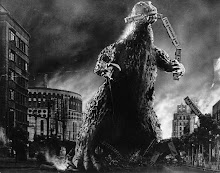
La Haine (The Hate) - 1995
Director: Mathieu Kassovitz
Writer: Mathieu Kassovitz
Players: Vincent Cassel, Hubert Kounde, Said Taghmaoui
[http://www.imdb.com/title/tt0113247/]
The Gist:
Here we have three boys from the French slums amidst great turmoil. A recent case of police brutality has hospitalized a friend of theirs (how close of a friend is ambiguous, given that the seem to know everyone in the slums to some extent). In reaction to this act, the slums are stirring with riotous and righteous fury. This sentiment is mirrored in the young men to varying degrees. Vinz has a found a gun (which was likely a gun lost to a police officer during the riots, though it is never explicitly stated as such), and with this gun we have a guarantee as a viewer that he will come to some confrontation with violence. Vinz has stated that if his friend dies he will shoot a cop. Hubert finds this declaration to be an act of stupidity. Said seems to be the middle ground, ambivalent to the greater concerns his friends are coping with. Beyond this setup is an odd road trip to Paris, weird interwoven references to the influence of "violent American culture", many moments of unnecessary contention to show off the influence of our violent American culture, and a beautiful yet pretentious moral ending wrapping everything up.
Why It's Kind of Cool:
By the time Kassovitz made this film, he basically only had one little art house film under his belt. With his sophmore attempt he got into Cannes, got himself a Criterion release on his DVD, and won a fair bit of praise. A lot of that has to do with the technical grace of the film. In fact, some times I found myself annoyed because the camera work was too spot on, too perfect. Like a refined Guy Ritchie film, moving the camera to eliciting a response and less for specific meaning. This could sound like a slight, but it actually compliments the film very well. Upon reflection, the camera seems to mimic the irrationality of hate and the directionless anger of its subjects. The film also has themes of America's cultural influence, and thus the film evokes the fast paced showy style of many contemporary American films (I used Guy Ritchie as an example because, let's face it, his films are Americanized heist films with British accents. His good films anyway). Beyond the pure style of the film, you also have showy little French quirks of cinema that I always love. They break up their scenes with the time of day, and a lot of times come back to the same shot changed subtly. Other beautiful additions include an amazingly random monologue from an old man in the men's restroom talking about his glorious shit and then going into a tangent about a trip to Siberia or some such thing. That part was probably the best in the whole film.
Why it Could Have Been Better:
I may have already hinted at this, but this film is pretty flawed. For most the most part, it's forgivable. However, it has one glaring issue that will probably keep me from ever truly loving the film. This is it: two of its three main characters are just not very likable (Vinz and Said). The only one I really liked was Hubert, who was the voice of reason and yet still cheeky enough to pick some guys pocket in an art exhibit. Vinz however is so contentious, so eager for conflict, that every little provocation turns into him yelling at some elderly woman in the grocery line or brandishing his gun at some half naked guy with nunchucks. Said on the other hand is just kind of annoying and unscrupulous. Even when the film really picks up with the trip out to Paris, I found that my viewing was still spoiled by an unnecessary squabble in the art gallery or the guys being assholes to a perfectly well meaning drunk who actually saves them from going to jail (without reason given their hostility). Beyond this, the characters were never fleshed out enough for me to care why they were so angry, or at the very least be compelled. I'm sure the many provocations can be explained away by some bullshit about the atmosphere of hatred and violence but often it was forced and extraneous.

No comments:
Post a Comment